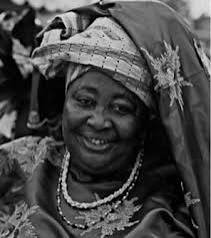An Al Jazeera article highlights Hajia Gambo Sawaba as one of Nigeria’s most frequently jailed female activists. She faced imprisonment 16 times for her outspoken stance against child marriage, forced labor, discriminatory taxes, and unpaid labor.
Born on 15 February 1933 and passing away in October 2001, Hajia Gambo Sawaba was a prominent Nigerian women’s rights activist, politician, and philanthropist. She held the position of deputy chairwoman of the Great Nigeria People’s Party and was the national leader of the women’s wing of the Northern Elements Progressive Union (NEPU).
Sawaba attended the Native Authority Primary School in Tudun Wada. However, her education was cut short following the death of her mother three years later and her father’s passing in 1943 due to persistent headaches. At the age of 13, she married Abubakar Garba, a World War II veteran.
After Hajia Gambo Sawaba became pregnant for the first time, her husband Abubakar Garba left and never returned. As a child, she demonstrated remarkable empathy towards people with mental illnesses. She would engage with them, offering assistance by providing money, clothing, and food to those in need.

Sawaba was often described as headstrong and stubborn during her childhood. She frequently found herself involved in street fights, driven by her inability to stand by and watch friends or relatives being mistreated. She confidently stated, “I could not stand by and witness a helpless friend or relative being abused.” She claimed to often win these confrontations, taking over the conflict by telling the weaker party, “OK, I have purchased the fight from you.”
Sawaba entered the political arena at the age of 17. At that time, northern Nigeria was largely controlled by the Northern People’s Congress, which had the backing of the Emirs and the British Colonial Authority. Despite this, she chose to join the opposition, the Northern Elements Progressive Union (NEPU). Sawaba was an ardent campaigner against underage marriages and forced labor, and she was a strong advocate for promoting Western education in northern Nigeria.
Hajia Gambo Sawaba championed Western education in northern Nigeria and vehemently opposed child marriage and forced labor. She was a vocal advocate against child marriage, unpaid labor, and discriminatory taxes. She also campaigned for job opportunities for women, education for girls, and full voting rights. However, her ex-husband’s family disapproved of her balancing motherhood with political activism, leading to an amicable separation. As was customary at the time, her baby daughter was handed over to her ex-husband’s family.
Sawaba gained significant recognition when she boldly addressed a room full of men during a political lecture in the North. She was mentored by the renowned Funmilayo Ransome-Kuti and traveled to meet her in Abeokuta years later. Sawaba is widely regarded as a pioneer in the fight for the liberation of northern women, and a general hospital in Kaduna has been named in her honor.

In 1952, Sawaba undertook a courageous initiative, going from house to house to speak with women observing purdah, a traditional form of social seclusion. Her actions led to her being presented before the Alkali (Magistrates) Court by the Native Authority in Kano on charges of “drawing out women who were in purdah.” She was sentenced to three months in prison, marking the first of 16 prison sentences she would endure throughout her life.
Hajia Gambo Sawaba faced frequent arrests to the extent that she always kept a blanket labeled “Prison Yard” nearby, ready to take with her whenever the police arrived. According to the Muslim Women Times, she endured severe mistreatment: on two occasions, she was stripped naked and subjected to eighty lashes in Zaria Central Prison. Additionally, she suffered the indignity and pain of having her hair shaved off with a broken bottle.
Gambo revealed that due to the torture she endured in prison in 1957, she required surgery to remove her womb in order to save her life. Despite these brutal experiences, she remained undeterred in her fight for justice and the rights of women in Nigeria.
Hajiya Gambo Sawaba passed away on October 14, 2001. After living a profoundly impactful and meaningful life, she departed like a true legend, succumbing to natural causes. Known for her unwavering commitment to social justice, she emerged as a pivotal figure in the women’s rights movement in northern Nigeria.
Hajiya Gambo Sawaba bravely and resiliently faced many social challenges during her life while steadfastly advocating for women’s liberation and empowerment. Her legacy lives on as she inspires new generations of women in northern Nigeria to fight for equality and their rights by serving as a source of hope.
Sources




